|
|
Post by tarkintino on Oct 11, 2017 14:40:43 GMT -5
No offence intended, Tarkintino, but the more you go on about Kirby, the more I get the impression you're taking this personally, for some reason: it's as if you feel personally offended by something about Kirby, perhaps his 2001 Treasury book - which as a commentary on someone else's work and not an original piece of his own, I've never paid much attention to, myself, though I very much enjoyed the first several issues of the series (which I read as a kind of science-fiction anthology book with a framing device borrowed from but not necessarily faithful to the film). No offense taken, although you are mischaracterizing my position. I used 2001 to illustrate just how glaring his ideas were in a situation where it completely clashed with an established work/concept. The mishandling/hackwork from Kirby's 2001 typifies so much of his 1970s output, and in "adapting" 2001, one can plainly see the "bigger is better"/"this is IT!"/"like nothing before!!" type of overblown creative tendencies. Take a look at the Kirby/2001 piece posted by Reptisaurus!--far from an isolated view on how wrong Kirby was for a film of that kind. Comic artists and writers have egos. That's not breaking news, or a revelation to anyone who has seen some of these people in person or listened to their responses to questions. To that end, comic artists are notoriously aware of their status & place in the industry. In other words, yes, I'm saying he had an ego--not on the Bob Kane or Neal Adams level--but he was not the little man humbly scribbling out pics in a corner, either. Ego was there, which ties into my point from a few days ago: some creators--particularly when praised too much for their own good--adopt a kind of "I can do whatever I want" / "I AM great!" mentality with no ability to step outside of self to see excess or shortcomings. After the praise he received in the wake of leaving Marvel (the 1st time), its not a stretch to say any other success fueled his habit of repeating worn-out ideas, always quick to "go big" (as if that meant better) with content that clearly yelled out its "importance" (in consideration of reputation?) rather than actually being important. My point about Metal Hurlant and the Warren magazines is that there was content as intellectually challenging if not more than Kirby's work. That did not mean every story contained within, but that Kirby was certainly not alone at a time when higher concept sci-fi had fully influenced comics of the 1970s. I think your argument would be applicable if not for the fact Kirby's ideas are also in question, not just the delivery of said ideas with his brand of art. That would be interesting to see. |
|
|
|
Post by berkley on Oct 11, 2017 22:33:55 GMT -5
I still have the impression that most readers who dislike Kirby's 70s stuff don't really look at the ideas, or if they do, they've already gone into the exercise convinced that because the art and the dialogue seem childish (or whatever derogatory adjective you prefer) to them, the ideas, such as they are, must be childish as well and can be dismissed without taking much trouble. Also there's the association of Kirby with the superhero genre because of his 60s work, which I think led many readers at the time to expect . So I don't think the concepts get a fair shake, if they're looked at at all. That they usually aren't is I think evident from how these characters are treated by other creators.
And I still get the impression you're not being upfront about where your hostility towards Kirby's stuff comes from. It seems to go beyond a simple dislike, when you feel the need to attack it even here in a thread dedicated to that particular creator.
|
|
|
|
Post by tarkintino on Oct 12, 2017 17:43:04 GMT -5
I still have the impression that most readers who dislike Kirby's 70s stuff don't really look at the ideas, or if they do, they've already gone into the exercise convinced that because the art and the dialogue seem childish (or whatever derogatory adjective you prefer) to them, the ideas, such as they are, must be childish as well and can be dismissed without taking much trouble. Also there's the association of Kirby with the superhero genre because of his 60s work, which I think led many readers at the time to expect . So I don't think the concepts get a fair shake, if they're looked at at all. That they usually aren't is I think evident from how these characters are treated by other creators. I think you are using the default Kirby-defender position, which paints all critics with the same, inapplicable brush of being incapable of breaking out of their cape & cowl-addled minds to "get" his work, and/or write off Kirby's ideas thanks to his reputation/association with superheroes. Again, innumerable readers were buying titles with concepts as or more challenging than Kirby's--with a few of those stories written or illustrated by talents best known for working in superhero comics, so there was no preconceived notion at work. It was--for many--and can be a matter of readers thinking his work was just not good, innovative or expansive as others believed it to be. You are continuing to mischaracterize my position. There is no "hostility" just as there's none in the endless threads and/or posts about artists or writers who fall under the critical microscope. To suggest anything personal is moving analysis to a false category of "hater" (attacking the messenger, instead strictly addressing the message), when every post from Kirby critics have specifically noted issues with art or story. If that's not to the liking of some, then its not, but there's nothing personal in the analysis of Kirby's 1970s work at Marvel. I've yet to see a thread where the subject is universally praised, as no comic or talent has ever earned that kind of credit. |
|
|
|
Post by berkley on Oct 12, 2017 19:40:24 GMT -5
I can see this isn't getting anywhere, but I'm also saying that many readers who did like some of the more progressive or innovative comics of the day - by writers like Gerber and Englehart at Marvel, for example - tended to assume that because Kirby's comics did not resemble those in any obvious way, there couldn't be much to them. It appeared to many of these readers that they were just bad superhero comics or just bad comics period. You can see this in the negative letters at the time and in the way most nay-sayers talk about it today.
Your posts don't leave me with the impression of unbiased critical analysis you describe, but all right, if you say so. In any case, I'd say you've made your point: you don't like Kirby's 70s work. You think he was a dumb guy who was jealous of the younger generation and tried to do something he thought was progressive science fiction like they were doing but he didn't have the brains or the skills to pull it off. OK, got it.
|
|
|
|
Post by tarkintino on Oct 16, 2017 22:34:44 GMT -5
I can see this isn't getting anywhere, but I'm also saying that many readers who did like some of the more progressive or innovative comics of the day - by writers like Gerber and Englehart at Marvel, for example - tended to assume that because Kirby's comics did not resemble those in any obvious way, there couldn't be much to them. It appeared to many of these readers that they were just bad superhero comics or just bad comics period. You can see this in the negative letters at the time and in the way most nay-sayers talk about it today. Your posts don't leave me with the impression of unbiased critical analysis you describe, but all right, if you say so. In any case, I'd say you've made your point: you don't like Kirby's 70s work. You think he was a dumb guy who was jealous of the younger generation and tried to do something he thought was progressive science fiction like they were doing but he didn't have the brains or the skills to pull it off. OK, got it. I see you are determined to continue mischaracterizing my position--a defensive posture because you cannot imagine anyone not seeing Kirby's 70s Marvel work as great or innovative without being so brain-battered by tights and capes that they were utterly incapable of absorbing/understanding Kirby's bombast and retreaded ideas. So be it, but bias is also the inability to accept that others see deficiencies and/or problems in something you like, which leads to the aforementioned mischaracterization (instead of carefully paying attention to how and why anyone in this thread criticized Kirby's work, such as the 2001 analysis). |
|
|
|
Post by berkley on Oct 16, 2017 23:21:58 GMT -5
I'll try one more time.
Leave superheroes out of it altogether: I believe there are a lot of readers who cannot get past the perceived clunkiness of Kirby's dialogue and narration. It sounds - to them - unsophisticated, simplistic, choose your own adjective. I find it entirely understandable that these readers would have a hard time imagining there's anything of much value in the underlying concepts to these comics, since the surface narrative sounds so childishly bombastic to their ears. I happen to think they're very wrong, that there is a lot more going on underneath the surface of comics like the Eternals and the New Gods than it might appear.
I'd even go farther and say that the dialogue and narration usually (there are exceptions, even to my ears) aren't nearly as bad as they're often made out to be. I've noticed that it's usually the same handful of lines that tend to be trotted out as examples when people talk about how bad Kirby's writing is (the old "Funky corn" bit in the Eternals, for example). But there are many, many more examples of what seems to me perfectly serviceable writing on Kibry's part. More importantly, there are many instances where his writing illuminates in a very clear manner some of the key concepts informing the story as a whole. I think these moments are indispensable to the work and would most likely have been watered down or even lost altogether if he'd hired or been assigned a script-writer to write the dialogue and captions for him.
I understand that it isn't be easy to convince detractors of either of these points.
As for the 2001 Treasury Edition, like I said, it doesn't seem that important to me as part of Kirby's body of work. To you, as far as I understand what you've been saying, it seems like the crowning proof of Kirby's ineptitude, and thus as evidence that can be used to demonstrate a similar failure of perception and ability in his work as a whole. I would say, try to look at each individual work on its own merits, forgetting what you think of the other stuff.
|
|
|
|
Post by codystarbuck on Oct 18, 2017 21:34:19 GMT -5
Black Panther #1  An African leader and a dwarf walk into a room....  Sounds like the start of a bad joke; but, it is the beginning to one weird comic. T'Challa and a man named Mr Little (little too on the nose, there, Jack) enter a room to find a dead man and a frog statue. he's been stabbed and the stabber is soon to be revealed...  Mr Little speaks of King Solomon's Frog (must have followed him down the mine) and T'Challa's grandfather and collectors and other odd things, when our armored friend attacks and the fight begins. T'Challa gets a babyface comeback; but, the armored goon heads for the hills faster than the late Bobby Heenan, in his prime. Mr Little tells T'Challa that the frog is actually a time machine and it pops warriors out of their time and they freak out, often killing the person holding the frog. T'Challa's grandfather buried it, for safety; but, it was unearthed by others. They take a spiffy copter to Mr Little's place and are attacked along the way. 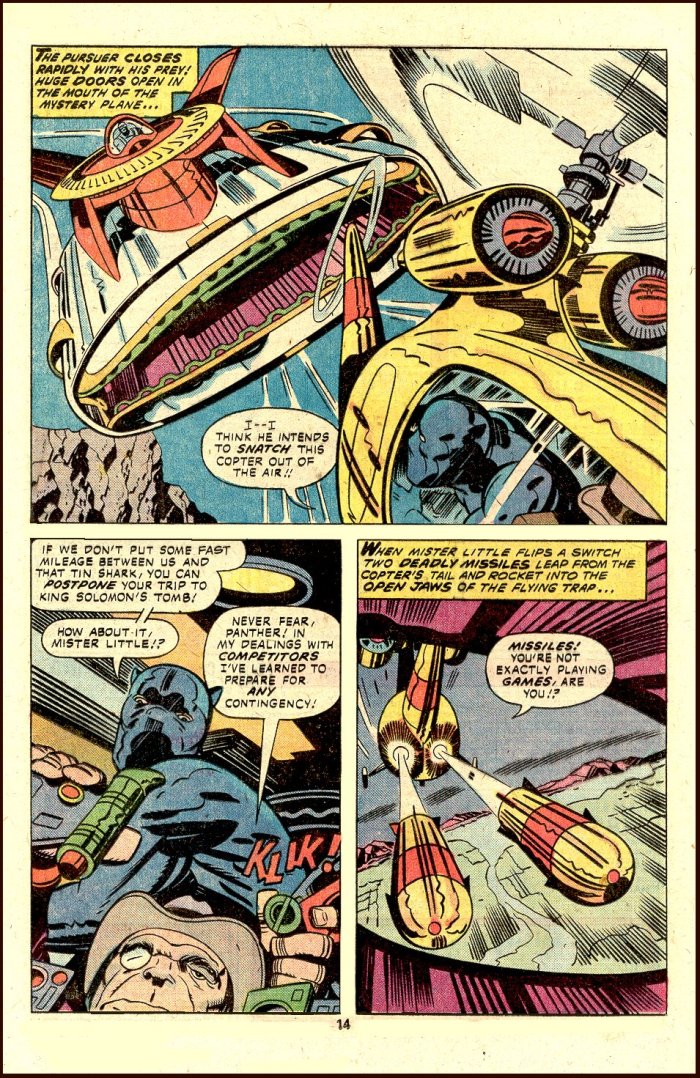 Before you can say Little Nellie, Mr Little fires missiles at his attackers. Little tells the Panther a story about a creature unleashed by the people who unearthed the frog and we see how the legend of Ali Baba was born. Just as he finishes, they are attacked by more goons... 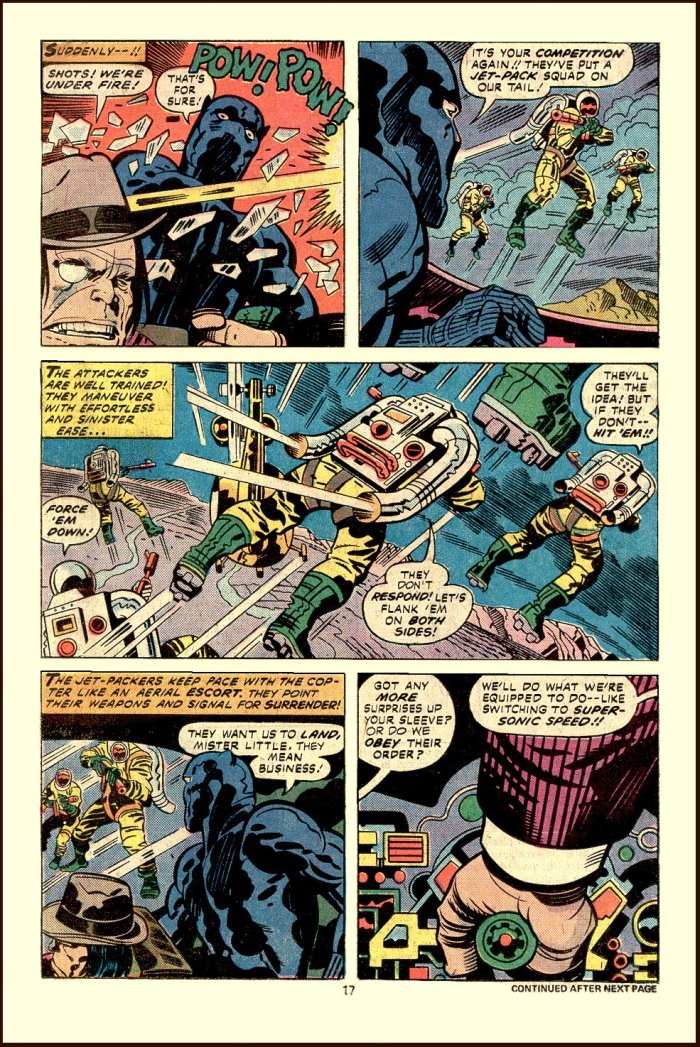 Before you can say "nitrous boost," the copter is gone and lands at Mr Little's home... 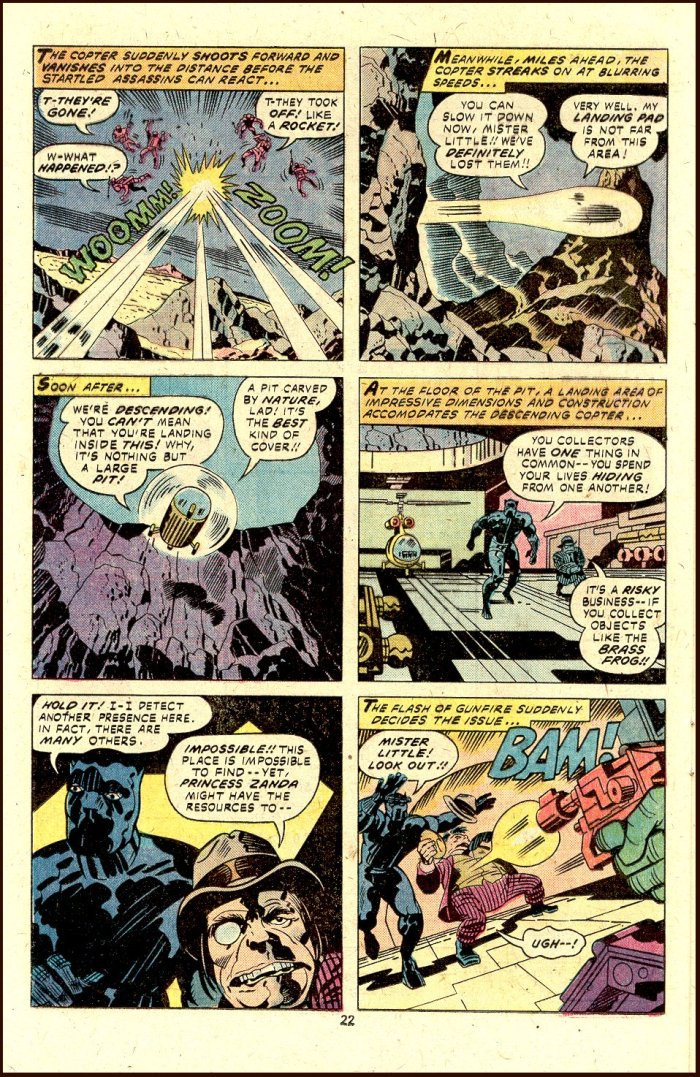 You get the feeling that Jack had just watched You Only Live Twice on ABC? Once inside, they are attacked by more goons and we meet up with Princess Zanda, who could give Tina Turner a run for her money... 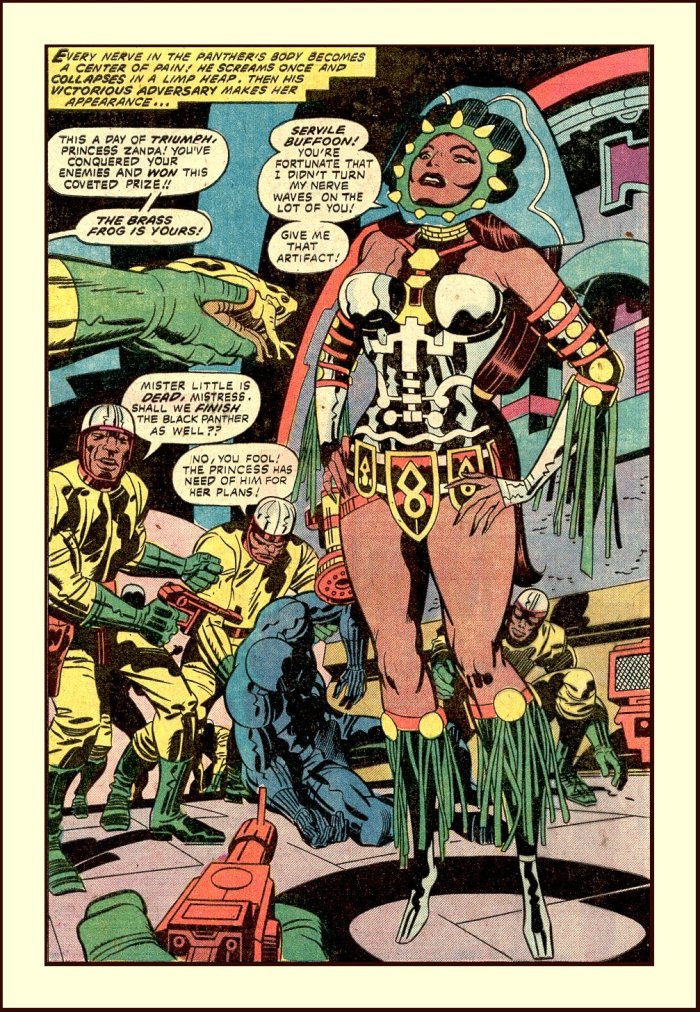 She wants the frog and T'Challa is overwhelmed. She has the frog and offers T'Challa a bargain, to work with her; but, he rejects, kicks the frog and unleashes its power, which brings someone from the future... 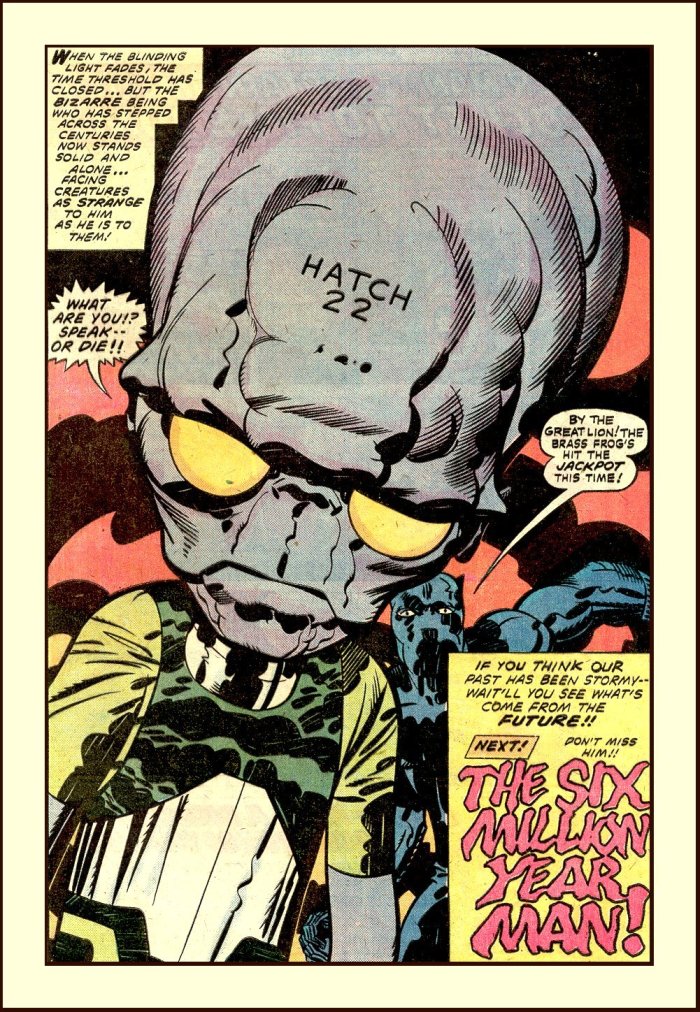 Did I mention that this was really weird? Anyone expecting Don McGregor was in for a surprise. Jack wasn't interested in what came before. He rarely was. He was out to make a good story and that's what he tries to do here. He lays out what his intention is on the letters page, where he says that a comic book superhero's job is to entertain, sell comics and keep everyone involved from catching the Tasmanian Crud. In other words, Jack is out to tell entertaining stories, not tightly interconnected stories, with intricate continuity. Jack was from an era when the comic audience grew up and moved on and a new one came on the scene. His job was to capture that new audience, not keep feeding one that was leaving behind comics anyway. Problem is, comics were changing. The rise of specialty shops and the Direct Market meant that the niche audience was becoming a bigger factor; certainly a more vocal one. That audience thought this was a more childish version of the hero they enjoyed in Jungle Action, in "Panther's Rage." However, the mass audience, who may have seen this comic, probably didn't know from the Black Panther. Looking at the story on its own merits and not previous Panther stories, it is exciting, it is intriguing; it is......a bit clunky. I won't sugar-coat it; Jack's dialogue is pretty rough, here. To those who said he couldn't write I point them back to the Fourth World books, especially "The Pact" and "The Glory Boat,' as well as a large chunk of Mister Miracle, in the middle of the run. Jack could write and his dialogue worked there. Here, it's another story. Jack didn't like to look backwards and when he came back to Marvel, he wanted to create new comics, just as he set out to do at DC. However, just as with DC, Marvel wanted the old Jack stories and Black Panther was his creation (well, co-creation). He took on the assignment, like the good soldier he was, and decided to do him as conceived, as a pulp adventure hero, from a hidden land, which harbored a secret. He throws him into a pulp world of cursed artifacts, dead collectors, legends and double-dealing mercenaries and their bosses. It's H Rider Haggard, Edgar Rice Burroughs, and Lester Dent, all rolled into one. Jack lays it all out; he is out to do High Adventure, in a classic sense, and he certainly does so in the first issue. It ends up being one part OMAC and a bit Justice, Inc, to compare to his then-recent DC work. Taken within that context, there is an exciting story here, though it is very confusing. You are kind of thrown headlong into it and have to just ride the wave and work things out. Jack's art is certainly powerful and vibrant, but his character abstraction was very prevalent. This is not the sleeker Black Panther of Billy Graham or John Buscema, or even Silver Age Kirby. He is bulkier, but not blocky. Some of the designs of the characters are a bit busy and somewhat abstract, but no less exciting. Jack is grand and operatic, as were the pulps that he read. I first encountered this in my teen years, at my cousin's house. I will admit to preferring the McGregor/Graham "Panther's Rage stories to this and thought Jack's art looked grotesque. However, tastes evolve, with age and new experience. Oh, I still prefer McGregor's story; but, I appreciate more what Kirby is doing here. Having read more of his work, I have seen how he evolved as an artist. He stripped things down to the essential, much like an Impressionist artist. He is opera on the comic page, filled with arias and overtures. Problem is, the rest of Marvel was trying to be the New Wave of American Cinema; longing to be Friedkin, Scorsese, Bogdanovich, and Kubrick (and, soon, Spielberg and Lucas). They aspired to be Puzo and Tom Wolfe. Kirby wanted to tell entertaining stories, mostly for children and adolescents. They were still the main part of the comic market, as the newsstand was still king. Make no mistake, this isn't Kirby at his best; but, it isn't Kirby at his worst. It is Kirby taking on a book, reluctantly, and trying to make it entertaining adventure, not make political or social statements, or to write grandiose prose and film-quality dialogue. He was trying to tell a great yarn, like he enjoyed in his youth. I always felt there was room for both approaches and Jack usually told a good yarn, even when the work wasn't an instant classic (and Kirby had more of those than just about anyone). |
|
|
|
Post by tarkintino on Oct 18, 2017 21:51:49 GMT -5
Leave superheroes out of it altogether: I believe there are a lot of readers who cannot get past the perceived clunkiness of Kirby's dialogue and narration. It sounds - to them - unsophisticated, simplistic, choose your own adjective. I find it entirely understandable that these readers would have a hard time imagining there's anything of much value in the underlying concepts to these comics, since the surface narrative sounds so childishly bombastic to their ears. I happen to think they're very wrong, that there is a lot more going on underneath the surface of comics like the Eternals and the New Gods than it might appear. Once again, this makes the wild assumption (or stereotype) that readers were incapable of seeing beyond the surface to see what the meaning of it all was. They did, but found it to be poor in concept and/or too much of what they had already seen from Kirby. Readers are not to be painted with a broad brush all to say Kirby's work had some merit they were just to distracted (by the style of dialogue and/or art) to see. No one said his work was incomprehensible. They are saying (among many things) it was not well conceived, overblown and not effectively making its point. Of course it was important. Kirby being tasked with adapting a film that was already considered a cinema classic (in and out of the sci-fi film genre) was significant for his career--the icing on the cake of his return to Marvel. Further, the advertising for Kirby adapting 2001 was as large and loud as any for its top-selling superhero comics of the period, and certainly set the stage for how Marvel would advance sell then-future adaptations such as Star Wars. There's no honest way of underselling how adapting so important a film was for Kirby's image at the time. The only flaw of it all was allowing Kirby to..."Kirby-ize" a film that certainly needed no help or personal plot embellishment. Noted days ago, the analysis of 2001 exposes the contrast--the "Kirby-izing" to what remained of the film plot. In examining it in that manner, one gets a clear picture of his extremes and concepts, and how said concepts--in comparison to the film plot--were not these soaring exercises in thought-provoking sci-fi or interesting philosophical exploration, as some would have the world believe. |
|
|
|
Post by berkley on Oct 19, 2017 2:42:28 GMT -5
Love Princess Zanda!
I also loved the McGregor Panther and I think it was perhaps because the Kirby series was so drastically different that I didn't have any trouble enjoying it on its own terms. Like some of us were saying in another thread a while ago, in hindsight, I don't see why they couldn't have run both series simultaneously. One of the few ways I think the industry has improved is that I can imagine that being done today, but back then it wasn't likely. Of course the Panther also wasn't a popular enough character to warrant two books at the same time.
I agree that his visual rendition of the character lost the cat-like quality that had been present in his own Silver-Age version and even more so with John Buscema and later Billy Graham. Again, it never really bothered me too much, as I just accepted the new version as part of his style.
|
|
|
|
Post by kirby101 on Oct 19, 2017 7:57:50 GMT -5
As far as the 2001 adaptation goes. For those of us buying comics at the time and reading Kirby's new Marvel books, no, it wasn't a big deal. It really wasn't part of the conversation about his work at the time.
|
|
|
|
Post by berkley on Oct 20, 2017 1:57:10 GMT -5
Eternals #8  Thena doesn't look so bad-ass in this one; she must be playing it up for Kro. Our story opens in a gladiatorial match, being watched by Lord Tode and other Deviants. One guy is kicking everyone else's backside from Sunday to Saturday, looking like a Kirby version of a luchador... Tode calls a halt to the donnybrook and orders the Reject be brought forth and Kirby muses what the Deviants would consider a Reject. The peanut gallery is calling for his head for being defiant and not one of them. Tode calls for him to be unmasked and reveal the hideous form of .... This handsome dude. WTF? Well, when you look like a human or Eternal, in a city of monsters, you tend to be the outcast. Tode decrees he must keep fighting until they find someone who can knock his block off. Meanwhile, Kro and Thena talk about old times. Kro still has the hots for her but, she puts him in the friend zone. Ouch! Turns out, she is probably more afraid of what daddy would think, or her buddies. Shallow, shallow goddess/superbeing. Kro says he's gotta head hom and want her to come with him and meet his folks, so to speak. Sersi messes around with Dr Samuel Holden, while Kro and Thena slip off. The doc is mad, necause his resident Deviant and squeez left without notifying him and Sersi tells him to lighten up and dance, as she transforms objects in the room into a big band. Thena has gone with Kro to Lemuria. They are welcomed when they arrive and a deformed creature is driven off when he stumbles into Thena. She hears of Purity Time and Kro shows her. Death Wagons have scooped u the truly deformed and are taking them to a building with vast energy and flames emerging from it, to purify the Deviants. It's pretty chilling as Kirby definitely seems to be aiming for a Holocaust metaphor, especially the early targeting of the mentally ill, who were often gassed in trucks, with the exhaust filtered into the truck, poisoning them with carbon monoxide. Kirby's version is more elaborate but no less horrific. Kro leads her on as combat is about to begin. The Reject gets a suit of flexible armor and turns on his handlers and snatches his weapon away from them. They flee to dry their britches. Thena is brought before Tode and insults him. She isn't happy about the combat, either. Kro urges patience, as they are fighting a millenia of fear and ignorance. She see the Reject and how handsome he is, questioning if he is a Deviant. The Reject notes she loos like him, yet sits with royalty. Then, his opponent enters the arena... Our story ends as the Reject goes off to face this monster. Outstanding issue, as we learn more of Kro and Thena's unrequited attraction to each other and how he convinces her to return to his people. We meet Ransak, the Reject, one of the more engaging characters, a Deviant who is hideous to Deviants, because he is so handsome. This idea is a bit borrowed from Dr Doom, where Kirby's concept was that he had a bit of a scar on his face, but was otherwise handsome. He feels he is hideously scarred because his perfection is marred by a slight flaw. It also matches an old Twilight Zone episode. Sersi has a bit of fun for a few panels and Kirby also throws some hard metaphors at us. One of the best issues so far. Now, with Karkas here, it's going to get even better! Way behind on my comments on Codystarbuck's reviews of these Eternals issues. I think this is where I left off. The first thing that comes to mind about the Reject's introduction is that he's one of Kirby's relatively low-powered combat characters, like super-soldier Captain America. And of course the contrast between his handsome appearance and that of his fellow Deviants is the other striking thing about him in this first appearance. Both aspects are important to the character. The Thena + Kro scene is an important set-up for what happens later on. Very interesting that while the name Thena is obviously derived from the goddess Pallas Athena, the story alluded to in their dialogue is the story of Persephone's visit to the Underworld. There's more going on here than meets the eye. The Death Wagons scene is another significant moment, a big factor in the way this whole 3-issue story plays out and therefore very important for the series as a whole - because I think this story in Eternals #8-10 is crucial to the entire series concept. |
|
|
|
Post by tarkintino on Oct 24, 2017 18:28:20 GMT -5
As far as the 2001 adaptation goes. For those of us buying comics at the time and reading Kirby's new Marvel books, no, it wasn't a big deal. It really wasn't part of the conversation about his work at the time. I have to disagree. I was reading Marvel at the time, attending cons--the works, and not only did Marvel make a big deal about Kirby adapting the legendary film (as artist and writer), but many a Kirby fan were excited at the idea ( before the release, mind you) of seeing THE sci-fi film (pre- Star Wars) in comic form from a man as associated with sci-fi concepts in comics as he was superheroes, hence the pre-release excitement. That excitement was not rewarded once the treasury and spin-off monthly were released, but for fans rating Kirby's return to Marvel at the time, they counted 2001 to reach whatever conclusions about the quality of his second stint at the company. |
|
|
|
Post by kirby101 on Oct 24, 2017 19:20:39 GMT -5
So you admit, once published, it was no big deal and wasn't really part of the conversation about Kirby once it was published.
Just what I said.
I would also say that on re-reading the 2001 comic series later I found it much better than the first time.
The first time I remember mainly Mr. Machine, Machineman. But it was much more interesting than that.
|
|
|
|
Post by codystarbuck on Oct 24, 2017 21:27:45 GMT -5
Black Panther #2  Our cover finds Hatch 22 with Excedrin Headache #44, Princess Zanda is the envy of Lady Gaga, and T'Challa checks to see if his pits smell...... ....or something like that....... All hell has broken loose, as Hatch 22 is kickin butt and taking names...  While T'Challa and Zanda ask "Whose that guy with the big head?"... ...he blasts the bejeezus out of them. T'Challa blanks out his mind and does some push ups, then gets the drop on hatch and knocks him out. Zanda turns into the NRA spokesperson and wants to shoot him, while he is unconscious; but, T'Challa stops her. He says they must find the twin of King Solomon's Frog to send the future man back and he ain't taken no lip from Zanda. he laments over the seemingly dead body of Mr Little, who gets better. Turns out, he had a bulletproof vest and is okay. They get their stuff together, when their locale turns all cosmic and we see the future world and where Hatch 22 (shades of Heller!) came from and see someone attacking him, in some kind of weird brain/jellyfish ship (Milo? Major Major?) We see Hatch fight it off, then it is revealed that it was ll a dream (and you were there, and you, and Toto, too). They decide to head to King Solomon's burial chamber, to find the twin frog and Mr Little turns out to have some sweet transport, to get them there... 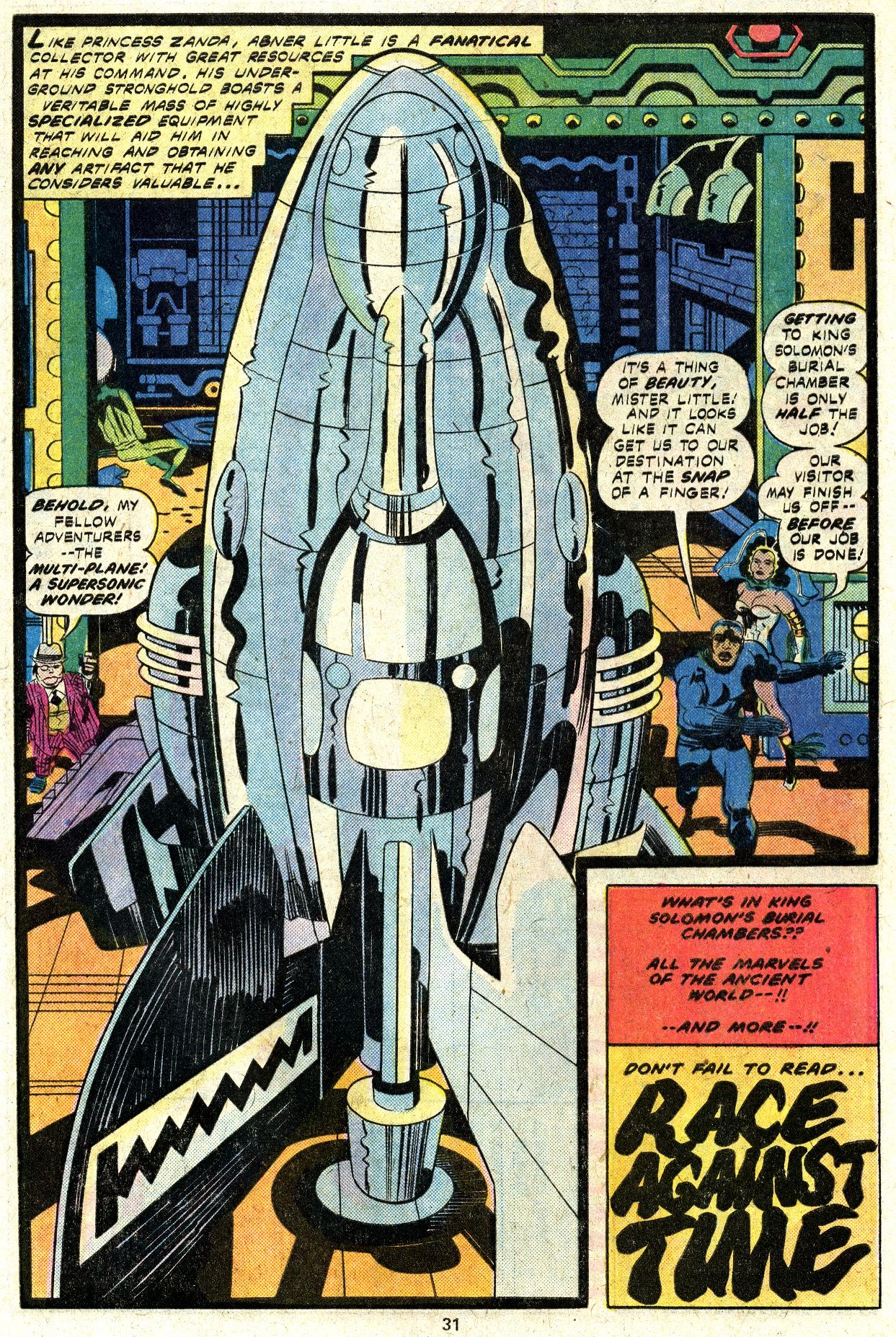 Well, stuff happens, we get a look at a weird future and Kirby kind of spins the wheels in place. Things are still kind of confusing and disjointed; but, there are some intriguing ideas here. |
|
|
|
Post by Reptisaurus! on Oct 24, 2017 23:13:59 GMT -5
As far as the 2001 adaptation goes. For those of us buying comics at the time and reading Kirby's new Marvel books, no, it wasn't a big deal. It really wa sn't part of the conversation about his work at the time. I have to disagree. I was reading Marvel at the time, attending cons--the works, and not only did Marvel make a big deal about Kirby adapting the legendary film (as artist and writer), but many a Kirby fan were excited at the idea ( before the release, mind you) of seeing THE sci-fi film (pre- Star Wars) in comic form from a man as associated with sci-fi concepts in comics as he was superheroes, hence the pre-release excitement. That excitement was not rewarded once the treasury and spin-off monthly were released, but for fans rating Kirby's return to Marvel at the time, they counted 2001 to reach whatever conclusions about the quality of his second stint at the company. Dude. Stop. At this point you're just crapping all over this thread and making it hard to find worthwhile content. Honestly, it seems disrespectfull of Cody's hard work. You've both made your vague non-arguments ad nauseum. |
|













